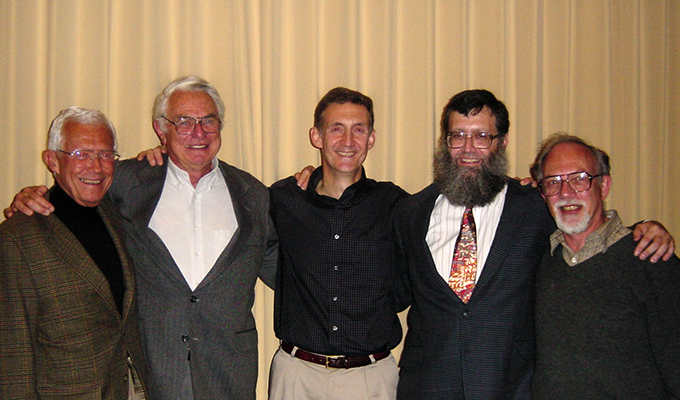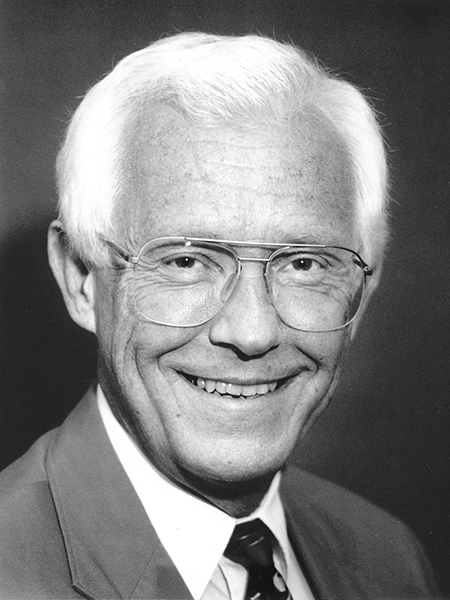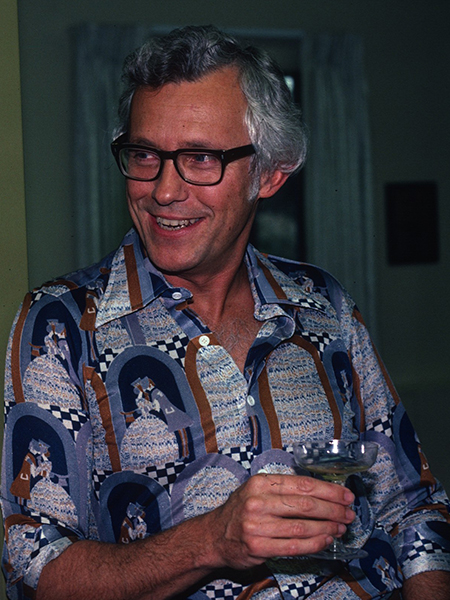The Allen School family is mourning the recent passing of Bob Ritchie, one of our founding faculty members who helped build the foundations of Computer Science & Engineering at the University of Washington as we know it today.
Originally from Alameda, California, Ritchie earned his bachelor’s from Reed College and his Ph.D. from Princeton University — both in Mathematics — before joining the faculty of Dartmouth College in 1960. He had a near escape when, two years later, he was nearly recruited by Bowdoin College before opting to return to the west coast and join the UW instead. Ritchie started out as a professor of Mathematics, before the existence of a distinct computer science program on campus. He later joined forces with six other faculty members to push for the creation of the Computer Science Group, which was the predecessor of the Department of Computer Science. That, in turn, became the Department of Computer Science & Engineering, and ultimately, the Paul G. Allen School.
Ritchie was among the original cadre of seven full-time faculty that comprised the early department and helped establish its reputation for excellence in theoretical computer science research and teaching. He became the second permanent department chair in 1977, succeeding interim chair Hellmut Golde after inaugural chair Jerre Noe stepped down. During his six-year term, Ritchie led the department to national prominence, earning a place among the top 10 programs in the country — and from there, we never looked back.
“Hellmut and Jerre established our culture. Bob established our external reputation,” said professor Ed Lazowska, who joined the faculty the same year Ritchie became chair. “A United Airlines ‘100,000 Miler’ plaque hung on the wall of Bob’s office — miles accrued flying around the country telling people that something exciting was happening in computer science at the University of Washington.”
While Ritchie’s impact in raising the reputation of the program was significant, his technical excellence and commitment to mentorship are equally important aspects of his legacy. Ritchie was an early pioneer in the creation of what is now called computational complexity: the theory of the time and storage needed to solve computational problems. He was among the first to examine classically defined computations from mathematical logic and show that they are equivalent to modern complexity classes defined in terms of time and storage, calling them “predictably computable functions.” As professor emeritus Richard Ladner recalled, Ritchie was keen to help other researchers branch out into theory.
“Bob Ritchie was my first mentor when I joined the Computer Science Group in 1971. We both had backgrounds in mathematics and had moved into computer science theory,” he said. “Bob supported my transition from mathematics to theory research. He pointed out which were the important conferences to attend, and advised me which journals I should publish in. My first NSF grants were joint with Bob.
“We met on a regular basis until I got on my own feet,” Ladner continued. “I will always be grateful for his early mentoring that helped me get off to a flying start as a teacher and researcher.”
Ritchie advised two of the early Ph.D. students produced by the then-fledgling Computer Science Group — John Baker and Richard (Dick) Hamlet (Ph.D., ‘71) — in addition to supervising graduate students in Mathematics, his original home at UW. One of these students, Francine Berman (Ph.D., ’79), fondly remembers Ritchie and the program he helped to create.
“Bob was one of my thesis advisors and he was always supportive and encouraging,” recalled Berman, who, like several students in those early days in the school’s history, was officially enrolled in another academic department but advised by Computer Science faculty. “I’m sure I am among many that he helped along the way. CS at UW was a very special place in those days, as it is now, and provided a place to nurture so many of us.”

Ritchie also had a reputation for being a steady leader and an astute negotiator of bureaucracy. According to professor emeritus Jean-Loup Baer, who arrived at UW in the second year of the Computer Science Group’s existence and would later go on to become department chair, Ritchie would remain “cool and composed” when faced with unexpected challenges.
“While our first chair, Jerre Noe, was building a strong faculty core, he relied heavily on Bob’s knowledge and influence in his dealings with the UW administration,” Baer explained. “Almost 10 years later, when Bob asked me to be his Associate Chair, I was able to witness first-hand how his brilliant mind dealt in creative and non-obvious ways with the intricacies of large organizations.
“Bob was an important participant in the negotiations that brought the first two large collaborative projects with industry: the creation and funding of the VLSI Consortium, and the contract with DEC for the development of the Pascal Compiler,” he continued. “I was Acting Chair while Bob was on sabbatical when we received the delivery of the VAX-11/780 as part of the Pascal Compiler deal. The only hitch was that it was a few months early, and the room where it was to be housed was not ready. I wish I had kept my email exchange with Bob — I know that mine contained the three words ‘panic, Panic, PANIC.’ Of course, Bob guided me to a solution and the VAX spent a few weeks, or months, in the campus surplus store. By watching Bob I learned that when dealing with academic administrations one has to be patient, calm, and creative and that the shortest path between point A and point B is not necessarily a straight line.”
After completing his term as chair of CSE in 1983, Ritchie departed the UW to embark upon a second career in industry, holding positions in the research divisions of Xerox and Hewlett-Packard. But it is his influence on the emergence of UW as a powerhouse in computer science education and research that continues to be felt today.
“Bob propelled us to write the proposal that led to the first award in NSF’s Coordinated Experimental Research program, which put us on the map in computer systems. He also managed to wangle us a top-10 ranking in the 1982 National Academies assessment of doctoral programs,” noted Lazowska. “We remember him for his leadership, for his advocacy, for his friendship — and for his shirts.”
Ritchie is survived by his wife of 62 years, Audrey; daughter Lynne Gustafson; son and Allen School alumnus Scott Ritchie (B.S., ‘83); and five grandchildren: Katherine, Erin, Kelly, Callum, and Sean. We at the Allen School are keeping them in our thoughts as we celebrate Bob’s legacy to our program, our university, and our field.




